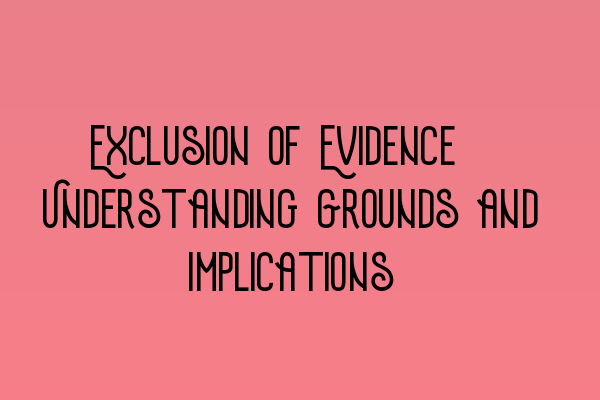Exclusion of Evidence: Understanding Grounds and Implications
Welcome to SQE Criminal Law & Practice Law UK! In this article, we will delve into the topic of exclusion of evidence and explore the various grounds for exclusion and their implications. Understanding this aspect of criminal law is crucial for legal professionals and those seeking justice. So, let’s get started!
Grounds for Exclusion
When it comes to criminal trials, the exclusion of evidence can occur for a variety of reasons. These grounds are designed to protect the rights of defendants and ensure a fair trial. Let’s take a closer look at some of the key grounds:
- Illegally Obtained Evidence: Evidence obtained through unlawful search and seizure or in violation of other legal rights may be excluded from trial. This ensures that individuals are not subject to unfair or unconstitutional practices.
- Hearsay: Hearsay evidence, which is an out-of-court statement offered for the truth of the matter asserted, is generally considered unreliable and therefore excluded. However, there are exceptions to this rule, such as statements made by a declarant who is unavailable to testify.
- Privileged Communications: Certain communications, such as those between an attorney and client or doctor and patient, are protected by privilege and cannot be used as evidence without the express consent of the privilege holder.
- Expert Opinions: Expert opinions are often crucial in criminal trials, but they must be based on reliable methods and principles. If an expert’s opinion does not meet this standard, it may be excluded.
These are just a few examples of the grounds for exclusion of evidence. Each case is unique, and it is essential for legal professionals to thoroughly analyze the evidence presented to determine if any grounds for exclusion apply.
Implications of Excluding Evidence
The exclusion of evidence can have significant implications for a criminal case. If key evidence is excluded, it may weaken the prosecution’s case or even lead to its collapse. Conversely, if evidence crucial to the defense is excluded, it can hinder the accused’s ability to present a strong defense.
Furthermore, the exclusion of evidence can impact the overall integrity of the criminal justice system. It serves as a check on law enforcement misconduct and encourages adherence to legal procedures and rights. This ensures that individuals are afforded a fair trial and that the truth is pursued within the boundaries of the law.
Conclusion
Exclusion of evidence is a vital aspect of criminal law that aims to protect the rights of defendants and ensure a fair trial. Understanding the grounds for exclusion and their implications is crucial for legal professionals and those seeking justice. If you would like to learn more about related topics, consider reading our articles on duress and undue influence in contracts, consideration in contracts, express and implied terms in contracts, counter-offers in contract law, and mistake in contract law.
We hope this article has provided you with valuable insights into the exclusion of evidence in criminal trials. Should you require further legal assistance, please don’t hesitate to contact SQE Criminal Law & Practice Law UK.
